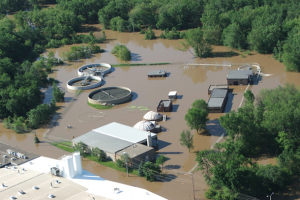The flooding from Hurricane Florence caused a lot of different impacts around North and South Carolina, including impacts on agriculture, highways, businesses and residences, but one impact that I have not read much about is the impact on potable water supplies. Since many water treatment plants are built near rivers, deep floods can destroy them or damage their ability to provide clean water to residents for weeks and sometimes months after the floods abate. This week’s Roadmap question from the Georgia Climate Project discusses the impact of changing climate on providing good water to Georgia residents. Fortunately, what will likely be Tropical Storm Michael when it passes over Georgia this week is not going to be dropping the staggering amounts of rain that Florence did because it will be moving quickly, and so flooding is not going to be much of an issue in this storm, but the next Florence could hit the Georgia coast instead of farther north, so it is something we need to consider well before the store hits.
23. What are the most effective and efficient investments to improve resilience of potable water infrastructure under different and uncertain future climate and water use scenarios in Georgia?
Why this question is important: Major water infrastructure projects are typically very expensive to build. While no government would want to have insufficient infrastructure to provide its citizens with clean water, it is also possible to overinvest in infrastructure when alternative lower cost interventions (Gleick 2003) are possible. However, uncertainty regarding precipitation patterns, as well as urban development patterns, consumers’ willingness to engage in water conservation measures, and water price will influence infrastructure investment choices. Collaborative work between water managers and researchers can identify high risk future scenarios requiring large infrastructure investment as well as robust low-cost measures that would preclude the need for overinvestment in infrastructure (Groves et al. 2008; Lempert and Groves 2010). Some water utilities and planning districts in Georgia have conducted research into the potential impacts of climate change; for example, the Metropolitan North Georgia Water Planning District conducted a Utility Climate Resilience Study (Metropolitan North Georgia Water Planning District 2015) and the Brunswick-Glynn County Joint Water and Sewer Commission conducted a climate resilience assessment in 2017. Other water utilities could benefit from similar research to identify key risks to water supply, assess the robustness to uncertainty of different investments and interventions, and make explicit the assumptions regarding demographics, climate change, and consumers’ water use behavior.
